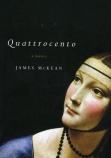Quattrocento
-by James MacKean
320 pages (2003)
BOOKYETI RATING:

a noteworthy first attempt
Expert violinmaker, McKean, ventures into new territory with his ambitious debut novel, Quattrocento - a story of fine art and love, cleverly disguised as time-travel conceit.
At the heart of the story is Matt O'Brian, an art restorer at the Metropolitan Museum of Art, who struggles with the realization that he has revealed a never before discovered quattrocento* masterpiece by Leonardo da Vinci; a painting of a beautiful young woman, who O'Brian names "Anna". The painting and the subject become the focus of his obsession, and O'Brian fears its discovery, as he does not wish to be parted from it. In the meantime, the Metropolitan Museum has finished the restoration of Federico's Studiolo, an ancient study, a placeO'Brian is often drawn to for quiet reflection.
Unwilling to psychologically part with the painting that he has worked tirelessly on, O'Brian ultimately loses himself to the mysterious allure of the studiolo, and finds himself unwittingly whisked across five centuries to the quattrocento to be with the painting's beautiful subject, Anna. There he discovers she is a Contessa and also an artist, married to an elderly man. It is not long before O'Brian also encounters her dangerous suitor, a covetous knight named Leandro, who plunges the art curator into a treacherous love triangle, vying for the Contessa's affections. After falling in love and sharing their affection with a discreet kiss, Matt is parted from Anna, and is returned to present day.
O'Brian, desperate to return to Anna summons the aid of some ambiguous quantum mechanics, and is somehow jettisoned back to the quattrocento to pursue her again freely. Her elderly husband has since passed away, and most importantly the jealous suitor Leandro is (somewhat too conveniently) gone.
McKean's imaginative Quattrocento is a sprawling tale that is more fantasy than it is drama. The author's artistic background serves him well throughout the novel, as details regarding the beautiful world of art are truly breathtaking. Several passages meld "castle in the sky" whimsy and reality as O'Brian loses himself inside various art works. And yet, throughout the novel, it seems as though McKean has bitten off a bit more than he can chew with regards to physics and the idea of time travel, as the descriptions become often tedious and lack a lot of logic. But his efforts do deserve at least a nod of appreciation from art and book lovers alike.
* Quattrocento: The cultural and artistic events of 15th century Italy are collectively referred to as the Quattrocento (from the Italian for 400, or from "mille quattrocento," 1400). Quattrocento encompasses the artistic styles of the late Middle Ages and the early Renaissance. -Wikipedia
02/02/2007
320 pages (2003)
BOOKYETI RATING:


a noteworthy first attempt
Expert violinmaker, McKean, ventures into new territory with his ambitious debut novel, Quattrocento - a story of fine art and love, cleverly disguised as time-travel conceit.
At the heart of the story is Matt O'Brian, an art restorer at the Metropolitan Museum of Art, who struggles with the realization that he has revealed a never before discovered quattrocento* masterpiece by Leonardo da Vinci; a painting of a beautiful young woman, who O'Brian names "Anna". The painting and the subject become the focus of his obsession, and O'Brian fears its discovery, as he does not wish to be parted from it. In the meantime, the Metropolitan Museum has finished the restoration of Federico's Studiolo, an ancient study, a placeO'Brian is often drawn to for quiet reflection.
Unwilling to psychologically part with the painting that he has worked tirelessly on, O'Brian ultimately loses himself to the mysterious allure of the studiolo, and finds himself unwittingly whisked across five centuries to the quattrocento to be with the painting's beautiful subject, Anna. There he discovers she is a Contessa and also an artist, married to an elderly man. It is not long before O'Brian also encounters her dangerous suitor, a covetous knight named Leandro, who plunges the art curator into a treacherous love triangle, vying for the Contessa's affections. After falling in love and sharing their affection with a discreet kiss, Matt is parted from Anna, and is returned to present day.
O'Brian, desperate to return to Anna summons the aid of some ambiguous quantum mechanics, and is somehow jettisoned back to the quattrocento to pursue her again freely. Her elderly husband has since passed away, and most importantly the jealous suitor Leandro is (somewhat too conveniently) gone.
McKean's imaginative Quattrocento is a sprawling tale that is more fantasy than it is drama. The author's artistic background serves him well throughout the novel, as details regarding the beautiful world of art are truly breathtaking. Several passages meld "castle in the sky" whimsy and reality as O'Brian loses himself inside various art works. And yet, throughout the novel, it seems as though McKean has bitten off a bit more than he can chew with regards to physics and the idea of time travel, as the descriptions become often tedious and lack a lot of logic. But his efforts do deserve at least a nod of appreciation from art and book lovers alike.
* Quattrocento: The cultural and artistic events of 15th century Italy are collectively referred to as the Quattrocento (from the Italian for 400, or from "mille quattrocento," 1400). Quattrocento encompasses the artistic styles of the late Middle Ages and the early Renaissance. -Wikipedia
02/02/2007